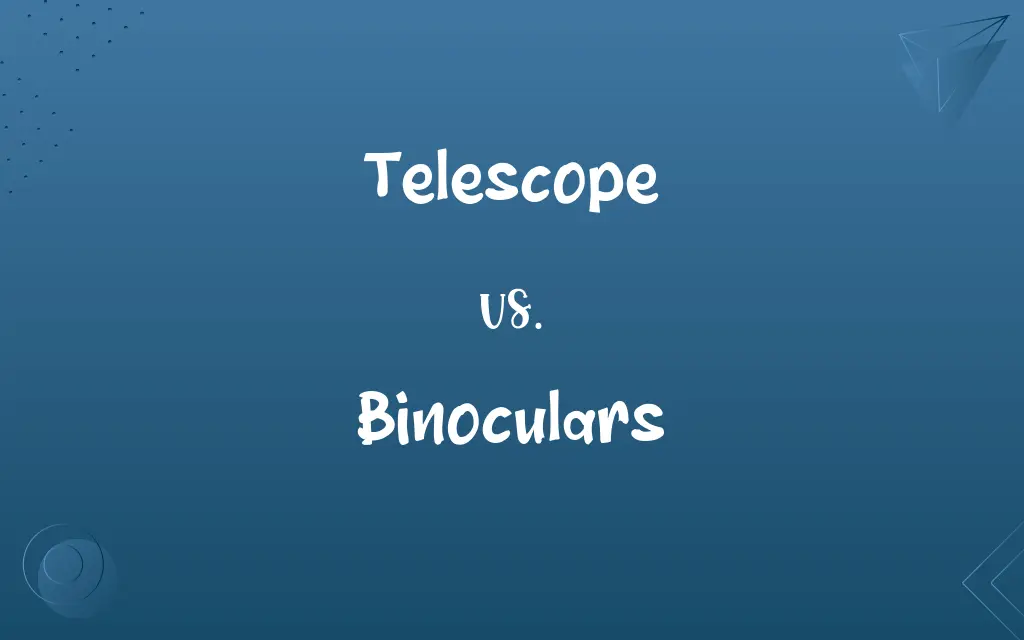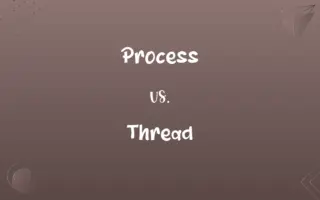Telescope vs. Binoculars: Know the Difference

By Shumaila Saeed & Dua Fatima || Published on September 21, 2024
Telescopes are designed for distant celestial observations, offering high magnification, while binoculars provide a wider field of view and portability for terrestrial viewing.

Key Differences
Telescopes are primarily used for astronomy, allowing users to observe distant celestial bodies with high magnification and detail. They often require a stationary setup due to their size and focus mechanism. Binoculars, on the other hand, are designed for portability and ease of use, featuring two parallel optical tubes that allow for comfortable viewing with both eyes, giving a 3D perspective.
Dua Fatima
Sep 21, 2024
Telescopes typically have a larger aperture, which is the diameter of the primary lens or mirror. This larger aperture captures more light, making distant and faint objects more visible and detailed. Binoculars, whereas, have smaller lenses and are more suited for observing objects on Earth, such as birds, wildlife, and sporting events, where light gathering is less critical than in astronomy.
Shumaila Saeed
Sep 21, 2024
The magnification of telescopes can be very high, making them ideal for studying small and distant celestial bodies. Binoculars provide lower magnification, which is more suitable for handheld use, offering a stable and wide field of view to observe larger areas of the night sky or distant scenes on Earth.
Shumaila Saeed
Sep 21, 2024
Telescopes often require mounts and sometimes complicated setups to target and track celestial objects due to Earth's rotation. Binoculars, on the other hand, are generally used without any support, though they can be mounted on a tripod for stability during prolonged observation sessions.
Hifza Nasir
Sep 21, 2024
The use of telescopes and binoculars also differs in terms of learning curve and accessibility. Telescopes can be complex and may require a significant amount of time to learn and use effectively. Binoculars, however, are more intuitive and can be used by people of all ages with little to no instruction.
Dua Fatima
Sep 21, 2024
ADVERTISEMENT
Comparison Chart
Magnification
High, suitable for distant celestial objects
Lower, suitable for closer, terrestrial views
Shumaila Saeed
Sep 21, 2024
Portability
Less portable, often requires setup
Highly portable, designed for handheld use
Shumaila Saeed
Sep 21, 2024
Field of View
Narrow, focused on specific objects
Wider, offers a broad perspective
Shumaila Saeed
Sep 21, 2024
Ease of Use
Requires time to learn and setup
Intuitive and can be used with little training
Dua Fatima
Sep 21, 2024
ADVERTISEMENT
Viewing Experience
Monocular, one eye viewing
Binocular, both eyes, 3D perspective
Hifza Nasir
Sep 21, 2024
Setup Requirement
Often requires mounts and tracking mechanisms
Generally used without support
Dua Fatima
Sep 21, 2024
Ideal for
Astronomy enthusiasts and detailed observations
Casual observing, sports, bird watching
Shumaila Saeed
Sep 21, 2024
Telescope and Binoculars Definitions
Telescope
A device for viewing distant objects by collecting electromagnetic radiation.
The astronomer peered through the telescope to observe the distant galaxy.
Shumaila Saeed
Mar 05, 2024
ADVERTISEMENT
Binoculars
Provides a 3D view, making them ideal for sports, bird watching, and other outdoor activities.
Watching the football game through binoculars, he felt as if he was on the field.
Shumaila Saeed
Mar 05, 2024
Telescope
Can have different types, including refracting, reflecting, and compound.
She preferred her compound telescope for its clear and bright images.
Dua Fatima
Mar 05, 2024
Binoculars
A handheld optical instrument with lenses for both eyes, used for viewing distant objects.
He used his binoculars to watch the eagles nesting across the lake.
Shumaila Saeed
Mar 05, 2024
Telescope
Often large and requires a tripod or mount.
Setting up the telescope took time, but the view of Saturn's rings was worth it.
Dua Fatima
Mar 05, 2024
Binoculars
Generally have a fixed magnification and focus.
Her binoculars, though fixed at 8x magnification, offered clear views of the distant mountains.
Hifza Nasir
Mar 05, 2024
Telescope
Requires adjustment and alignment for precise observations.
Aligning the telescope with the North Star was the first step of the observation night.
Hifza Nasir
Mar 05, 2024
Binoculars
Portable and easy to use for immediate viewing.
She packed her binoculars for the safari, excited for wildlife spotting.
Dua Fatima
Mar 05, 2024
Telescope
Provides high magnification and is used for celestial observations.
Through his telescope, he was able to detail the moon's craters.
Shumaila Saeed
Mar 05, 2024
Binoculars
Can be mounted on a tripod for stability during extended observations.
Setting up the binoculars on a tripod, they awaited the meteor shower in comfort.
Dua Fatima
Mar 05, 2024
Telescope
An arrangement of lenses or mirrors or both that gathers light, permitting direct observation or photographic recording of distant objects.
Shumaila Saeed
Mar 05, 2024
Binoculars
Relating to, used by, or involving both eyes at the same time:binocular vision.
Shumaila Saeed
Mar 05, 2024
Telescope
Any of various devices, such as a radio telescope, used to detect and observe distant objects by their emission, absorption, or reflection of electromagnetic radiation.
Shumaila Saeed
Mar 05, 2024
Telescope
A monocular optical instrument that magnifies distant objects, especially in astronomy.
Dua Fatima
Mar 05, 2024
Binoculars
OftenbinocularsAn optical device, such as a pair of field glasses or opera glasses, designed for simultaneous use by both eyes and consisting of two small telescopes joined together.
Shumaila Saeed
Mar 05, 2024
Telescope
Any instrument used in astronomy for observing distant objects (such as a radio telescope).
Shumaila Saeed
Mar 05, 2024
Binoculars
A hand-held device consisting of a series of lenses and prisms, used to magnify objects so that they can be better seen from a distance, and looked at through both eyes.
Dua Fatima
Mar 05, 2024
Telescope
An optical instrument used in viewing distant objects, as the heavenly bodies.
Shumaila Saeed
Mar 05, 2024
Binoculars
An optical instrument designed for simultaneous use by both eyes
Shumaila Saeed
Mar 05, 2024
Telescope
To slide or pass one within another, after the manner of the sections of a small telescope or spyglass; to come into collision, as railway cars, in such a manner that one runs into another; to become compressed in the manner of a telescope, due to a collision or other force.
Shumaila Saeed
Mar 05, 2024
Repeatedly Asked Queries
Can I see planets with binoculars?
You can see planets as bright points and observe some details like Jupiter's moons or the phases of Venus with high-powered binoculars.
Shumaila Saeed
Sep 21, 2024
How do I choose between a telescope and binoculars?
Your choice should be based on what you primarily want to observe, your budget, portability needs, and whether you're interested in casual viewing or detailed celestial observation.
Dua Fatima
Sep 21, 2024
What type of telescope is best for beginners?
Refracting telescopes are often recommended for beginners due to their simplicity, ease of maintenance, and good performance for observing the moon and planets.
Shumaila Saeed
Sep 21, 2024
What's the main difference between a telescope and binoculars?
Telescopes are designed for detailed observations of distant celestial bodies, while binoculars are meant for a wide range of closer, terrestrial observations.
Dua Fatima
Sep 21, 2024
What are the advantages of using binoculars for bird watching?
Binoculars offer a 3D perspective, are easy to carry and use, and provide a wide field of view, making them ideal for tracking and observing birds in their natural habitat.
Dua Fatima
Sep 21, 2024
How does the field of view differ between telescopes and binoculars?
Binoculars provide a wider field of view, suitable for observing large areas, while telescopes offer a narrow field, focusing on detailed observations of specific objects.
Shumaila Saeed
Sep 21, 2024
Can binoculars be used for stargazing?
Yes, binoculars can be used for basic stargazing, offering a wider field of view to observe constellations, the moon, and brighter celestial objects.
Shumaila Saeed
Sep 21, 2024
Are telescopes portable?
Some telescopes are designed to be portable, but generally, they are less portable than binoculars due to their size and the need for a mount or tripod.
Shumaila Saeed
Sep 21, 2024
Do telescopes and binoculars come with built-in cameras?
While most traditional telescopes and binoculars do not have built-in cameras, there are digital versions and adapters available for attaching cameras to them.
Hifza Nasir
Sep 21, 2024
Why do astronomers prefer telescopes over binoculars for detailed observations?
Telescopes have larger apertures and higher magnification, which are crucial for observing and studying faint and distant astronomical objects in detail.
Shumaila Saeed
Sep 21, 2024
Can children use telescopes and binoculars?
Yes, both instruments can be used by children under supervision, with binoculars being more accessible due to their ease of use and portability.
Shumaila Saeed
Sep 21, 2024
Share this page
Link for your blog / website
HTML
Link to share via messenger
About Author
Written by
Shumaila SaeedShumaila Saeed, an expert content creator with 6 years of experience, specializes in distilling complex topics into easily digestible comparisons, shining a light on the nuances that both inform and educate readers with clarity and accuracy.
Co-written by
Dua Fatima







































































